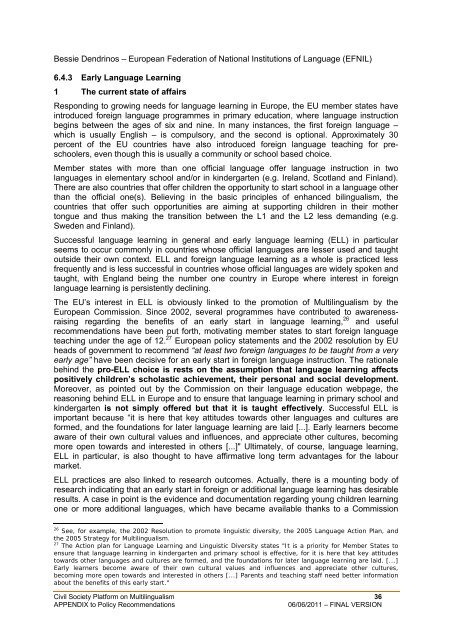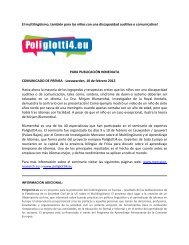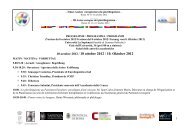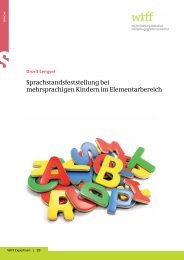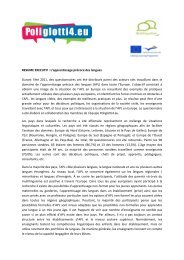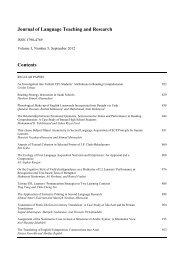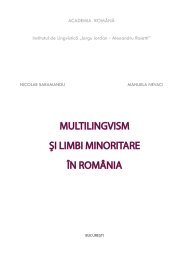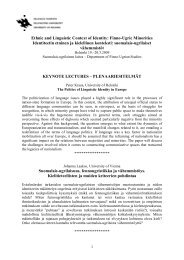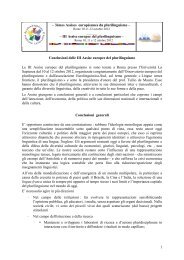FULL VERSION - European Commission - Europa
FULL VERSION - European Commission - Europa
FULL VERSION - European Commission - Europa
You also want an ePaper? Increase the reach of your titles
YUMPU automatically turns print PDFs into web optimized ePapers that Google loves.
Bessie Dendrinos – <strong>European</strong> Federation of National Institutions of Language (EFNIL)6.4.3 Early Language Learning1 The current state of affairsResponding to growing needs for language learning in Europe, the EU member states haveintroduced foreign language programmes in primary education, where language instructionbegins between the ages of six and nine. In many instances, the first foreign language –which is usually English – is compulsory, and the second is optional. Approximately 30percent of the EU countries have also introduced foreign language teaching for preschoolers,even though this is usually a community or school based choice.Member states with more than one official language offer language instruction in twolanguages in elementary school and/or in kindergarten (e.g. Ireland, Scotland and Finland).There are also countries that offer children the opportunity to start school in a language otherthan the official one(s). Believing in the basic principles of enhanced bilingualism, thecountries that offer such opportunities are aiming at supporting children in their mothertongue and thus making the transition between the L1 and the L2 less demanding (e.g.Sweden and Finland).Successful language learning in general and early language learning (ELL) in particularseems to occur commonly in countries whose official languages are lesser used and taughtoutside their own context. ELL and foreign language learning as a whole is practiced lessfrequently and is less successful in countries whose official languages are widely spoken andtaught, with England being the number one country in Europe where interest in foreignlanguage learning is persistently declining.The EU’s interest in ELL is obviously linked to the promotion of Multilingualism by the<strong>European</strong> <strong>Commission</strong>. Since 2002, several programmes have contributed to awarenessraisingregarding the benefits of an early start in language learning, 26 and usefulrecommendations have been put forth, motivating member states to start foreign languageteaching under the age of 12. 27 <strong>European</strong> policy statements and the 2002 resolution by EUheads of government to recommend “at least two foreign languages to be taught from a veryearly age” have been decisive for an early start in foreign language instruction. The rationalebehind the pro-ELL choice is rests on the assumption that language learning affectspositively children’s scholastic achievement, their personal and social development.Moreover, as pointed out by the <strong>Commission</strong> on their language education webpage, thereasoning behind ELL in Europe and to ensure that language learning in primary school andkindergarten is not simply offered but that it is taught effectively. Successful ELL isimportant because “it is here that key attitudes towards other languages and cultures areformed, and the foundations for later language learning are laid [...]. Early learners becomeaware of their own cultural values and influences, and appreciate other cultures, becomingmore open towards and interested in others [...]" Ultimately, of course, language learning,ELL in particular, is also thought to have affirmative long term advantages for the labourmarket.ELL practices are also linked to research outcomes. Actually, there is a mounting body ofresearch indicating that an early start in foreign or additional language learning has desirableresults. A case in point is the evidence and documentation regarding young children learningone or more additional languages, which have became available thanks to a <strong>Commission</strong>26 See, for example, the 2002 Resolution to promote linguistic diversity, the 2005 Language Action Plan, andthe 2005 Strategy for Multilingualism.27 The Action plan for Language Learning and Linguistic Diversity states "It is a priority for Member States toensure that language learning in kindergarten and primary school is effective, for it is here that key attitudestowards other languages and cultures are formed, and the foundations for later language learning are laid. [...]Early learners become aware of their own cultural values and influences and appreciate other cultures,becoming more open towards and interested in others [...] Parents and teaching staff need better informationabout the benefits of this early start."Civil Society Platform on Multilingualism 36APPENDIX to Policy Recommendations06/06/2011 – FINAL <strong>VERSION</strong>


